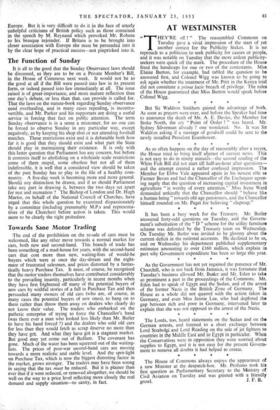The Function of Sunday
It is all to the good that the Sunday Observance laws should be discussed, as they are to be on a .Private Member's Bill, in the House of Commons next week. It would not be to the good at all if the Bill were passed-, into law in its present form, or indeed passed into law immediately at all. The issue raised is of great-importance, and more mature reflection than one day's debate, or less than that, can provide is called for. That the laws on the statute-book regarding Sunday observance need overhauling, and in many cases repealing, is incontro- vertible, and Mr. Parker and his supporters are doing a useful service in forcing that fact on public attention. The term Sunday observance is in a sense a misnomer, for no one can be forced to observe Sunday in any particular way, except negatively, as by keeping his shop shut or not attending football matches. These restrictions exist and it is debatable both how far it is good that they should exist and what part the State should play in maintaining their existence. It is only with this latter question that Parliament has any concern, but before it commits itself to abolishing on a wholesale scale restrictions some of them stupid, some obsolete but not all of them indefensible, it is well that a considered view should be taken of the part Sunday has to play in the life of a healthy com- munity. A five-day week is becoming more and more general. Should any distinction be drawn, and if so should Parliament take any part in drawing it, between the two days set apart for rest and recreation ? The Bishop of London and Dr. Hugh Martin, on behalf of the National Council of Churches, have urged that this whole question be examined dispassionately by a committee (including presumably M.P.s and representa- tives of the Churches) before action is taken. This would seem to be clearly the right prOtedure.


































 Previous page
Previous page